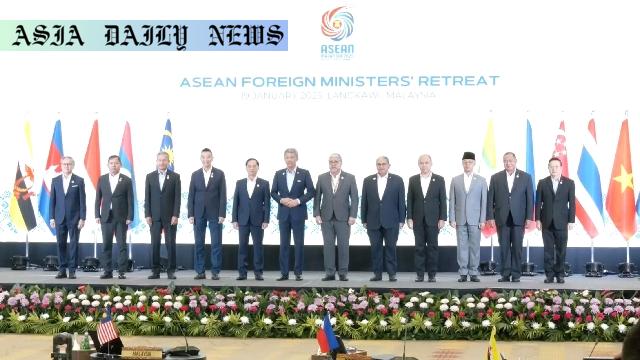ASEAN foreign ministers focus on ending violence in Myanmar and ensuring a transition to civilian rule.

The ongoing political and humanitarian crisis in Myanmar remains a pressing concern for the Association of Southeast Asian Nations (ASEAN). After a two-day meeting on the Malaysian island of Langkawi, ASEAN foreign ministers took steps to address the conflict, which has persisted since the military coup in 2021.
ASEAN has reiterated its commitment to assisting in the stabilization and restoration of peace in Myanmar. The foreign ministers expressed grave concern over the continued violence and the impact on the nation’s population. To address these challenges, a special envoy is set to be dispatched to Myanmar. The envoy’s primary mandate will be advocating for the immediate cessation of violence and advancing ASEAN’s five-point consensus, agreed upon four years ago, as a framework for resolving the crisis.
The ASEAN five-point consensus emphasizes critical steps such as an end to violence, constructive dialogue among all parties, and facilitation of humanitarian assistance through ASEAN channels. However, the military junta in Myanmar has faced criticism for not fully adhering to this framework, further intensifying international and regional scrutiny.
Focus on the Transition to Civilian Rule
Malaysia, this year’s ASEAN chair, has taken a leading role in pushing for a resolution. The Malaysian foreign ministry revealed that during the Langkawi meeting, Myanmar’s representative, the permanent secretary of the foreign ministry, claimed that a general election would be conducted in 2023. This announcement was met with caution by other ASEAN members, who stressed the importance of ensuring that such an election is free, fair, and transparent.
While differences in approach exist among member nations, there is consensus on the need for an immediate halt to hostilities. Countries such as Malaysia argue that peace and stability should be established first, while others emphasize the role of credible elections in paving the way for Myanmar’s transition to civilian governance.
Implications of the Prolonged Crisis
The crisis in Myanmar has far-reaching implications not only for the nation itself but also for the region at large. Refugee flows, cross-border tensions, and instability have strained ASEAN unity and its principle of non-interference. Several international organizations have criticized ASEAN for perceived inaction or limited scope in addressing Myanmar’s worsening situation.
The decision to send a special envoy signifies a renewed effort on ASEAN’s part to play a more active role. The envoy is expected to engage with key stakeholders in Myanmar, including the National Unity Government (NUG) and other opposition groups, to foster dialogue and negotiate compromises aimed at achieving peace.
A Path Forward
As the crisis approaches its fourth year, the need for decisive actions becomes all the more urgent. While the ASEAN framework faces challenges, the organization’s effort to push for the implementation of the five-point consensus signals a collective willingness to engage. It remains to be seen how Myanmar’s military government will respond to these initiatives. However, the deployment of a special envoy sends a clear message—violence is unacceptable, and a political solution remains the only path forward.
In the global context, ASEAN’s handling of the Myanmar crisis will be a litmus test for the regional bloc’s efficacy in navigating complex geopolitical challenges. Addressing the crisis transparently and constructively could bolster ASEAN’s credibility, both among its member states and in the international arena.
As ASEAN attempts to chart a roadmap for peace in Myanmar, the international community watches closely. Local and international stakeholders must continue to support efforts that ensure security, humanitarian relief, and a restored democratic process for the people of Myanmar.
Commentary
The crisis in Myanmar is a harsh reminder of the volatility that political instability can bring and the challenges regional organizations face in addressing such issues. ASEAN’s decision to send a special envoy to Myanmar underscores its recognition of the gravity of the situation, but this step alone may not suffice to resolve the crisis at hand.
Myanmar’s military coup has resulted in rampant violence, widespread displacement, and severe human rights abuses. Prodemocracy forces and ethnic insurgent groups opposing the junta deserve international recognition and support, yet ASEAN’s insistence on engaging solely with official representatives of the military raises questions about the bloc’s neutrality and commitment to democratic principles.
One of ASEAN’s biggest challenges lies within its principle of non-interference. While it has served the bloc well in maintaining regional diplomacy, the complexity of the Myanmar situation demands a more hands-on approach. ASEAN’s five-point consensus provides a framework, but without accountability measures and enforcement mechanisms, the framework risks being viewed as mere rhetoric.
What stands out from this recent shift is Malaysia’s active leadership in reinvigorating ASEAN’s stance. By prioritizing the cessation of violence and securing humanitarian assistance, Malaysia is attempting to bring pragmatism and humanity into the diplomatic process. However, for the consensus to succeed, ASEAN will need unequivocal support from all member states and stronger coordination with the international community, especially the United Nations.
The international reaction also plays a vital role in determining whether Myanmar can transition to civilian rule. Sanctions against the junta, strategic aid to legitimate opposition bodies, and consistent regional pressure could help shift the dynamics, though these measures will require significant political will and unity among key global players.
Ultimately, the people of Myanmar deserve peace and the ability to determine their country’s future. ASEAN’s actions—though well-meaning—must translate into tangible results. The dispatch of the special envoy will likely set a precedent for how the region handles future crises. Stakeholders must remain vigilant and committed to upholding justice and democratic values in Myanmar.


